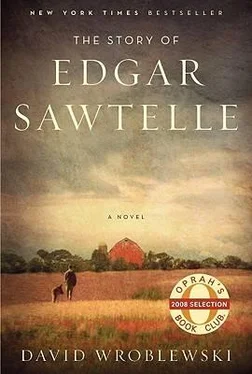“What is that?” Trudy said, when he walked into the kitchen. “Goddamn it, Edgar. What’s going on with you? You’re so closed up around your sadness you’ve left me here alone. You can’t do that. You can’t shut me out. As if you’re the only one who lost someone.” She put her hands on his shoulders. “In the mornings when you walk into the kitchen, I’ll see you out of the corner of my eye and think you’re him-”
That’s crazy. I don’t look anything like him.
“Yes you do, Edgar. You move like him. You walk like him. I’ve watched you in the whelping room and you even carry the pups like him, just the way you described, with your shoulders hunched up, taking those careful steps. Do you realize that there are times when I need to leave the house, when it’s just you and me, because I look at you and I feel like he isn’t gone? I come back from the barn some nights and I can’t help myself. I go up to your room to watch you. It’s the only time you let me near. It’s the only way I can get close. To you or him.”
I’m not him. I’m not half who he was.
Then a wrack of shivers ran through him. He pushed past Trudy onto the porch, buttoning his shirt. There was something else he’d wanted to say, but discovering the bruise on his chest had swept everything else from his mind.
“Edgar, I know what it’s like to disappear into bad feelings. I know how tempting it is. You think by going further into it you’ll finally come out the other side and everything will be okay, but it doesn’t work that way. You need to talk to me. I can’t shake the feeling you haven’t told me everything that happened.”
I did. I told you. I came down from the mow and there he was. I had to wait for someone to show up.
“The handset on the phone was shattered.”
I got mad and hit it on the countertop. I told you that.
“What else, Edgar? What else happened?”
Nothing!
“Then what is that?” she said, pointing at his chest.
I don’t know! I must have fallen against something. I just don’t remember.
“Edgar, I’ve watched you do it in your sleep. You’re hitting your chest. You’re trying to sign something. What is it?”
He couldn’t reply, paralyzed by the memory of throwing his fist against his body. Every time he thought of it he almost shook with the blow. He stood on the porch, his ragged exhalation matching hers, until at last he remembered what he’d wanted to say.
Claude isn’t like him, either.
Now it was his mother’s turn to be silent. She looked past him into the field and sighed. “After that last miscarriage, I wanted to have an operation to make it impossible for me to get pregnant. I liked that idea-that way I could be sure I’d never feel that bad ever again. But your father said I was only imagining the worst case. One more time, he said. Not because it won’t be terrible if it happens again, but because it will be wonderful if it doesn’t. And he was right, Edgar. The next time, we had you. I can’t imagine what our lives would have been like if your father hadn’t believed so strongly in fresh starts.”
He turned and stared out into the night.
“Edgar, there’s a difference between missing him and wanting nothing to change,” she said. “They aren’t the same things at all. And we can’t do anything about either one. Things always change. Things would be changing right now if your father were alive, Edgar. That’s just life. You can fight it or you accept it. The only difference is, if you accept it, you get to do other things. If you fight it, you’re stuck in the same spot forever. Does that make sense?”
But aren’t some changes worth fighting?
“You know that’s true.”
So how do you know which is which?
“I don’t know a way to tell for sure,” she said. “You ask, ‘Why am I really fighting this?’ If the answer is ‘Because I’m scared of what things will be like,’ then, most times, you’re fighting for the wrong reason.”
And if that’s not the answer?
“Then you dig in your heels and you fight and fight and fight. But you have to be absolutely sure you can handle a different kind of change, because in the end, things will change anyway, just not that way. In fact, if you get into a fight like that, it pretty much guarantees things are going to change.”
He nodded. He knew she was right but he hated what she said. A person could stop a specific thing, but they couldn’t stop change in general. Rivers can’t run backward. Yet, he felt there must be an alternative, neither willfulness nor resignation. He couldn’t put words to it. All he knew was, neither of them had changed their minds and neither of them could find anything more to say. He stood there until his mother turned and went into the kitchen, then he pushed open the porch door and walked to the barn.
THERE WAS PLENTY OF binder twine lying around the mow. With a little trial and error, he fashioned a double loop and a tail that he could knot around the bed frame. The thing was easily hidden beneath the blankets, and if she walked in at night, she wouldn’t see it. He passed his wrists through the rabbit ears. All it took was a twist to keep them from slipping free while he slept.
Late at night, the rotary dial on the telephone resonated through the walls, the rip of a digit rolled clockwise, the grind of the dial working backward, loud enough to wake him. Whatever part of her conversation wasn’t captured by the handset rode on air currents through that old house, a gray smoke so fine it drifted up the stairs and through the furnace registers, and wherever it brushed a wall, or a curtain, or a lightbulb, it crumbled into a dust that settled over everything.
In the mornings, he tucked the twine into the toe of an old tennis shoe and looked at his chest in the mirror.
It worked surprisingly well.
THE FIRST THUNDERSTORM OF spring came through in the middle of a night, lightning flashing through the sky and thunder rattling the glass in the windows. In the morning, the storm had lapsed into a ceaseless, undramatic rain. Slow, even sheets of water that paused for a minute or an hour, but soon enough returned, along with the splash of water running off the eaves. After two days, the basement began flooding. It was no surprise, and no emergency, either. The legs of the tables had long been set in coffee cans. Edgar watched the water seep through the rocks Schultz had set in the basement walls. The float rose in the sump pit twice an hour and the lights flickered as the motor engaged. Then a thump as the column of water hit the elbow in the vent pipe.
Outside, the world became a riot of vegetable odors, boggy and florid-the waft of old hay, tamarack, algae, moss, sweet sap and rotted leaves, iron and copper and worms-a musky yawn that hung in the yard.
FOR TWO NIGHTS IN a row the dogs woke him.
They’d begun leaving the run doors up at night and the dogs slept with their muzzles propped across the wooden thresholds. From his bedroom window he could make out their black noses and shining eyes. The first night he ignored their barks and rolled over and covered his head with his pillow, but the second night he detected a kind of fervor in their tone that drew him fully awake. He picked out the voices of Essay and Opal over the drumming of falling rain. He and Almondine knelt at the window. The dogs were standing wet in their runs, tails slashing happily behind them.
Deer in the orchard, he thought. Or a raccoon.
He went to the spare bedroom, where the window faced the orchard and the road. There was nothing to see. By the time he’d walked back to his room, the dogs were silent again. It occurred to him that the dogs might have seen Forte, and that idea cheered him. The stray seemed just contrary enough to come back after wintering with some adopted family.
Читать дальше
Конец ознакомительного отрывка
Купить книгу












